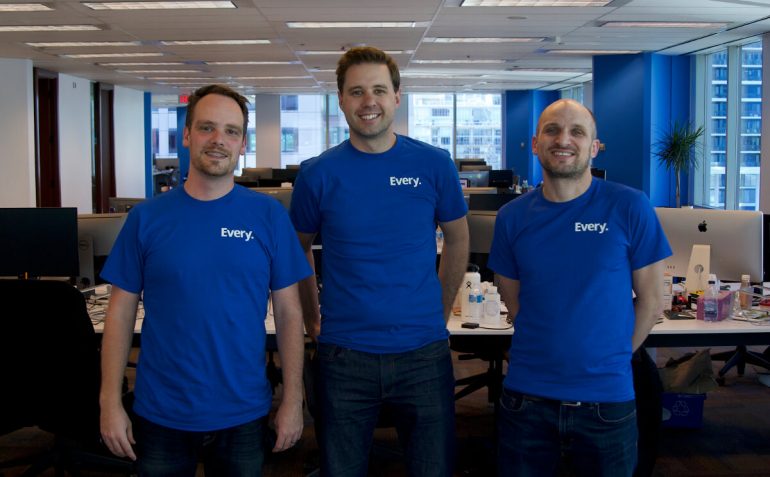Toronto-based Every has raised a $600,000 angel round as it looks to expand its banking platform for online entrepreneurs.
The round includes investors like former ING Direct CEO Peter Aceto, Wave CEO Kirk Simpson, AngelList Canada partner Alex Norman, Wealthsimple GM Jason Goldlist, Cadre head of Canada Raj Singh, and TribalScale. Every received investment through TribalScale’s Venture Studios, where Aceto is leading the financial services aspect of the program.
“We wanted to prove that we could get to market before we took out any serious institutional capital.”
Targeting entrepreneurs operating online businesses, Every allows users to have an online business bank account with a Visa debit card. The account can connect to services like Shopify, Stripe, Bitpay, and Square, while carrying out typical banking functions like transferring money and sending cheques, depositing funds, and paying bills. Every has pre-registered 2,000 businesses with plans to launch in July.
Speaking with BetaKit, CEO Jeremy Black said this segment of the market is underserved by traditional banks, which aren’t incentivized to serve customers that are difficult to monetize and require large customer acquisition costs.
“They have very different product needs than businesses that a traditional bank might serve, so those are the people that we’re targeting, and all we’re trying to do is give them a really low barrier of entry to getting a business bank account,” said Black.
The platform is currently only open to US entrepreneurs, partly because banking is more accessible in Canada than in the US, said Black. Interestingly, though, he said that this accessibility doesn’t always extend to Canadian entrepreneurs in his industry.
“Access to the US banking system as a non-bank is easier,” Black said. “[In Canada] I can’t issue a card alongside the Interac Association. As a non-chartered bank in the US, I can get access to the Visa and debit rails.”
Despite this setback, Black feels that the company is getting ahead of a trend led by the FinTechs over the last several years. Canadian startups like Wealthsimple and Wave are raising large amounts of capital based on the idea of unbundling services like accounting, investing, and payroll — but those services still need to be centralized somewhere.
“Those things have been unbundled for the bank, and they’re going to get rebundled somewhere. People aren’t going to go buy these things across 10 different sources in the future,” said Black. “Somebody can figure out how to create a holistic banking experience inside of those platforms, and rebundle everything with those platform partners. I think that’s the answer over the long-term.”
Every will use the funding for customer acquisition and growing the team. While the company has been bootstrapped since its creation in fall 2017, it took outside funding to get closer to FinTech experts like Simpson and Aceto, while demonstrating to potential banking partners that they have cash in the bank.
Part of the reason why the company was careful not to raise large amounts of capital right away, said Black, is to ensure that they’re still in touch with their customers. He said there’s also been an issue with FinTech investors getting “jaded” by FinTech startups launched by teams without the expertise to scale these businesses.
“We wanted to prove that we could get to market before we took out any serious institutional capital,” said Black.
With a co-founding team made up of three entrepreneurs, Black said they also identify with the entrepreneurs they’re looking to target. We don’t want to turn ourselves into this like, super well-funded drunk on venture capital institution that doesn’t look or feel anything like our customers anymore. We really want to stay connected.”


